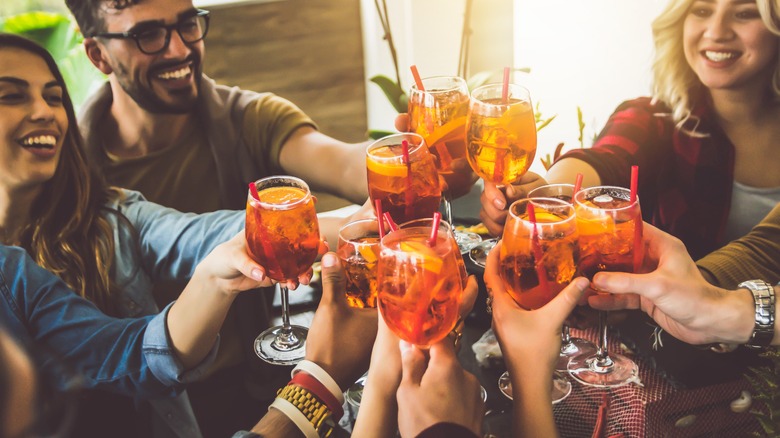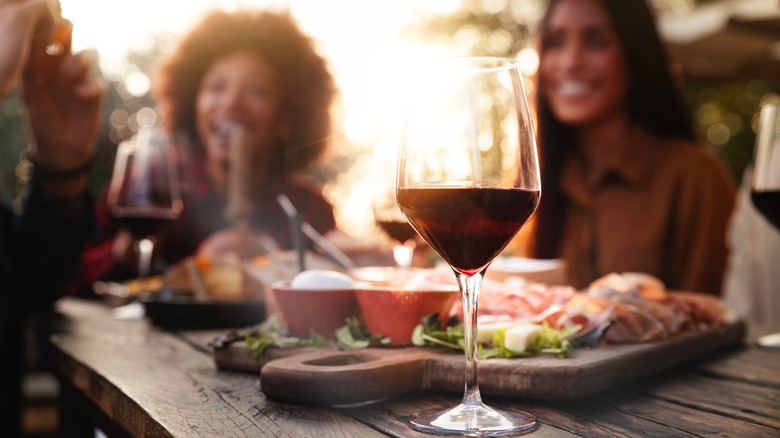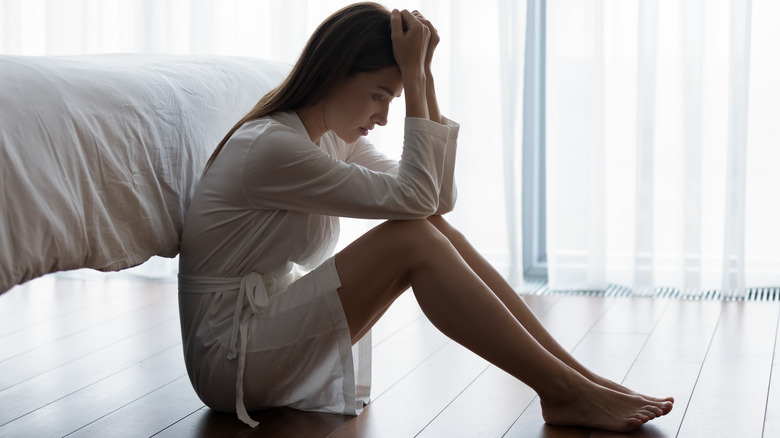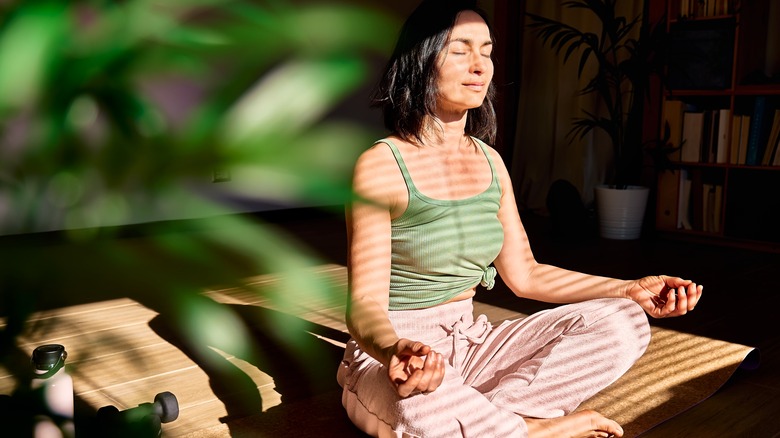Three Psychiatrists Weigh In On The Connection Between Alcohol And 'Hangover Anxiety'
We may receive a commission on purchases made from links.
Your Sunday Scaries might be hitting harder if you're spending Saturday night trying to drink them away. Unfortunately, experts are saying even just one or two drinks can have a serious effect on your mood the next day.
If Sunday stresses you out, the good news is you're not alone. A 2018 LinkedIn survey found 80% of workers deal with the Sunday Scaries, with an additional survey discovering the majority of panic setting in just before 4 p.m. on Sunday, per SWNS Research. This anxiety isn't anything more than the body's psychological response to a perceived threat which can come at us in the form of consecutive early mornings or a packed schedule for the week.
Anne Helen Petersen, author of "Can't Even: How Millennials Became the Burnout Generation" explains to The Atlantic that, "[T]he Sunday Scaries are about feeling an overwhelming sense of pressure" to have it all together, fueled by capitalism and class insecurity. Sure, you may have it all together right now, but that can change in an instant. Over-performing at home and work are ways of protecting ourselves against that fear.
Having a free night off can feel rare, especially when so many people work multiple jobs to try and keep that sweet, sweet financial stability. Going out with friends is a great way to feel less anxious, but using alcohol to ease your Sunday panic could actually be making things worse, according to healthcare professionals.
The connection between alcohol and anxiety
Just like there's a name for the specific type of anxiety that happens on Sunday around 4 p.m., there's a term for what The New York Times describes as "mild alcohol-induced ennui." "I see this all the time, clinically," Dr. Judson Brewer, a psychiatrist and neuroscientist at the Brown University School of Public Health, told The New York Times.
Dr. Carl Erik Fisher, an addiction psychiatrist at Columbia University, explains that alcohol has an impact on many body systems including, but not limited to, kidneys, immune system, and the brain (via The New York Times). Good Therapy adds that a side effect of drinking alcohol can be low blood sugar, especially if you're drinking on an empty stomach — something that can cause feelings of anxiety and panic.
Drinking alcohol to soothe our nerves actually is based in science. Dr. Ellen Vora, a psychiatrist who wrote a book about anxiety, told The New York Times that "alcohol mimics a calming brain chemical called GABA" that, when you stop drinking, your body fights to equalize. This process, Dr. Vora explains, releases glutamate, which can make us "feel restless and excited."
Dr. Vora adds that if cocktails we're drinking have a lot of sugar, the stress hormones released to deal with the inevitable "blood sugar crash" — cortisol and adrenaline — can also make us feel anxious, even if we're trying to sleep off the night's drinks.
The long-term effects alcohol can have on anxiety
Unfortunately, studies show self-treating anxiety with alcohol is a common mistake people make. In fact, a 2012 review of studies found that anxiety and alcoholism happen concurrently way more often than we realized. With the effect Dr. Ellen Vora told The New York Times alcohol initially has on anxiety, it's easy to understand why you'd think a glass of wine would help.
While alcohol messing with GABA, serotonin, and dopamine may initially make you think your anxiety has disappeared, studies show that, over time, alcohol can cause GABA levels to become depleted. When GABA becomes too depleted, panic and anxiety can permanently rise. Your Sunday Scaries can turn into an everyday event if you're not careful, per American Addiction Centers.
Tanking your mood the next day is only one of the side effects of drinking alcohol, especially if it's a major habit. In fact, while your anxiety may feel like it disappears when you're drinking, Healthline explains one of the major symptoms of alcohol withdrawal is increased anxiety — an easy addiction cycle to get swept up in. The longer alcohol abuse continues, Verywell Mind adds, anxiety levels rise and physical damage is caused to the brain, liver, and even your heart.
According to the Mayo Clinic, other symptoms of alcohol withdrawal can include nausea, vomiting, hallucinations, and even seizures. You may also experience extreme impairment when it comes to being able to do your job or function in social situations.
Sober-friendly ways to fight off the Sunday Scaries
According to psychologist Susan Albers, PsyD, there are proactive steps you can take to help curb your Sunday night stress load. Having a routine — whether it's meal prepping for the week or a hobby set aside just for Sunday around the time the scaries set in — can make a huge difference when 4 p.m. rolls around (via Cleveland Clinic).
Having things to look forward to not only can help fill the empty time you'd spend worrying, but according to CNN, these planned events can actually help even out your mood. Consider making one of your Sunday rituals planning out things to do throughout the week, even if it's something as small as treating yourself to your favorite kind of coffee to help you get through Monday.
Headspace, aside from recommending establishing a meditation routine, suggests trying to "stop negative self-talk." Instead, try reframing situations: Yes, you may have a long commute to work, but does the drive give you time to catch up on your favorite podcast? Meal prepping can turn into a time saver as well.
Other young professionals who try and get through the Sunday Scaries told The Atlantic by spending the set-in time doing something fun — visiting a museum, taking a relaxing bath, or going for a walk – were just a few ways to combine distracting your mind with moving your body, since studies show even light exercise can ease anxiety (via Harvard Health).



